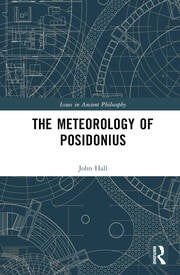Hall, J.J.
The Meteorology of Posidonius
2023.08. 296 Pages, 2 b/w Illustrations
(Issues in Ancient Philosophy. Routledge)
(Hb.) \37,180
This volume describes the meteorology of the Stoic philosopher Posidonius from the existing fragments, and discusses his relation to earlier thinkers on this subject, as well as the methods he used to obtain information about and to find explanations of meteorological phenomena.
The book examines ancient meteorology, an aspect of ancient thought largely neglected by scholars. Hall produces a detailed account of how Posidonius and other ancient thinkers approached and attempted to explain meteorological phenomena – phenomena familiar to everyone, which could not be ignored in attempts to understand the natural world, but were difficult to explain satisfactorily and convincingly despite the efforts of important ancient thinkers. The volume explores particular classes of phenomena, including climatic events and geological processes, providing a comprehensive overview of Posidonius’ ideas on these topics. Concluding chapters allow for an assessment of Posidonius’ particular contribution to the field and his influence on later writers working on this subject.
The Meteorology of Posidonius provides an important resource for students and scholars working on ancient philosophy and ancient science, particularly ancient meteorology.
The book examines ancient meteorology, an aspect of ancient thought largely neglected by scholars. Hall produces a detailed account of how Posidonius and other ancient thinkers approached and attempted to explain meteorological phenomena – phenomena familiar to everyone, which could not be ignored in attempts to understand the natural world, but were difficult to explain satisfactorily and convincingly despite the efforts of important ancient thinkers. The volume explores particular classes of phenomena, including climatic events and geological processes, providing a comprehensive overview of Posidonius’ ideas on these topics. Concluding chapters allow for an assessment of Posidonius’ particular contribution to the field and his influence on later writers working on this subject.
The Meteorology of Posidonius provides an important resource for students and scholars working on ancient philosophy and ancient science, particularly ancient meteorology.
Tabel of Contents
1. The definition of "meteorology" used in this book; 2. The biography and later reputation of Posidonius; 3. Sources for the study of Posidonius’ meteorology; 4. The history of Greek meteorology before Posidonius; 5. Earlier authors on meteorology used by Posidonius; 6. The region in which meteorological phenomena occur; 7. Climatic zones; 8. Thunder and lightning; 9. Lights in the sky: comets, the Milky Way and other phenomena; 10. Exhalations; 11. Winds; 12. Earthquakes and volcanoes; 13. The sea and its tides; 14. Rain, snow, hail and cloud; 15. Rivers: the Nile floods; 16. Rainbows, haloes and mock-suns; 17. Weather prediction and divination; 18. Meteorology and Providence; 19. Epicurean meteorology compared with that of the Stoics; 20. The place of meteorology among the different branches of knowledge; 21. Sources and methods in Posidonius’ meteorology; 22. Assessment of the meteorology of Posidonius and his successors.
